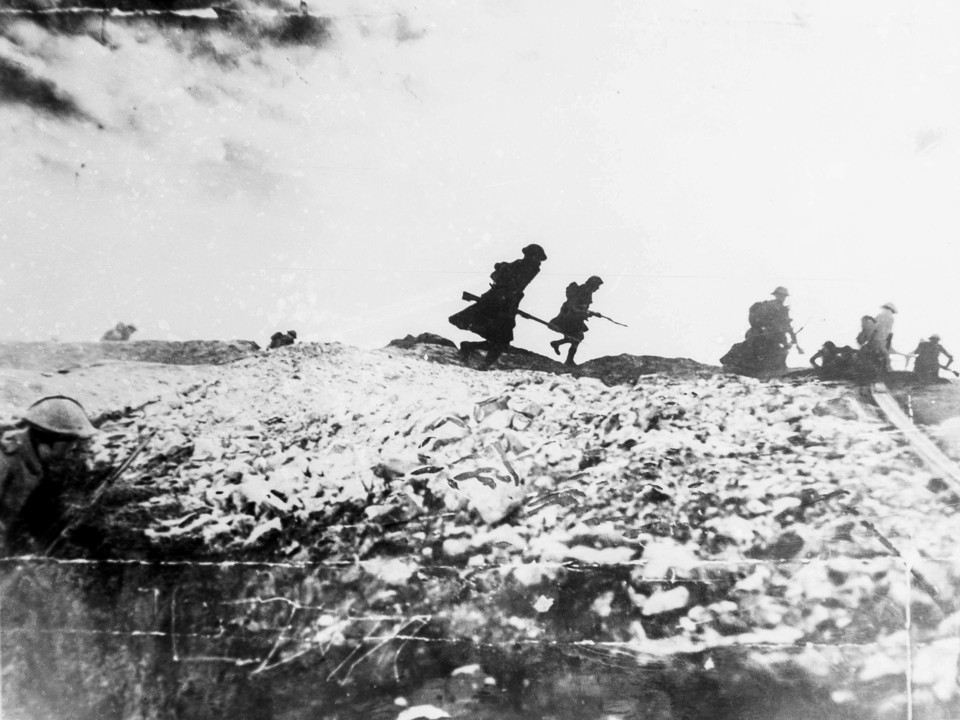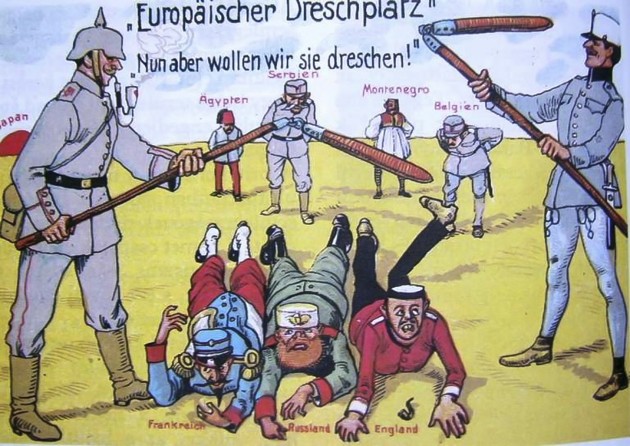88m3
Fast Money & Foreign Objects

An early morning attack by British forces on the Western Front in 1917AP
In the spring of 2015, my undergraduate son and I drove the length of the 1914-1918 Western Front, from the British battlefields in Flanders through the French zone in Champagne and Lorraine to the American cemeteries and monuments: Chateau-Thierry, St. Quentin, Belleau Wood, the Argonne. The nearer we approached the American sector, the fewer tourists shared the sites with us. Under the Menin gate at Ypres—a massive memorial to Britain’s lost—we were jostled among half a thousand men and women, boys and girls. In the overwhelming Meuse-Argonne cemetery, the largest American military burying place in all Europe, we stood alone.
A Twitter follower offered me a memorable explanation of the weak hold of the First World War upon the American consciousness. “Americans prefer the sequel: better villains, bigger explosions.” There’s something to that. But if this earlier war has faded from national memory, its aftermath shapes American culture.

The Real Story of How America Became an Economic Superpower
In the United States, the First World War is a rare example—George W. Bush’s Iraq War is another—of a war that became more unpopular after the fact than while it was being waged. The First World War’s horrific human and economic costs, the disappointment of hopes that the war would somehow reform or redeem society, the failure to achieve an enduring peace, the subsequent Great Depression that indicted the liberal world order for which so many Americans believed they had fought, the ensuing collapse of democracy in so many European countries, the slide toward a second world war—the experience of the two decades after the war systematically made mockery of every ideal and hope and promise for which Americans imagined they had joined the fight in April 1917.
Somebody had to carry the blame. But who?
That question would dominate the political debate of the interwar years. The response offered by many postwar critics of President Woodrow Wilson’s war leadership would slow the U.S. response to the rise of Adolf Hitler—and cast an influence over foreign-policy debates into our own time. The criticism continues to this day. From 1918 through the Iraq War, “Wilsonian” is the only word in the American foreign-policy lexicon that remains both a proud boast and a cutting insult.
In the interwar era, blame for U.S. entry into the now-reviled First World War was sometimes assigned to the sinister wiles of British intelligence, sometimes to the financiers at the Morgan Bank, sometimes to the profit-seeking of the U.S. armaments industry, sometimes to the inherent violence of capitalism itself. Between 1934 and 1936, a congressional committee chaired by Senator Gerald Nye of North Dakota gained headlines by its investigations of banks, munitions makers, and other so-called “merchants of death.” In their greed, these businessmen and bankers (it was alleged) had unscrupulously duped the good and trusting American people into treading “the road to war,” the title of an accusatory bestseller of the same period.

Not “democratic”—“safe for democracy.” Wilson wasn’t promising to impose democracy on Imperial Germany. He was promising to defend democracy from Imperial Germany. The First World War had not begun as a conflict between democracy and authoritarianism. Great Britain was not a democracy in August 1914. Tsarist Russia certainly was not. Ditto Japan, Italy, and Romania—all fought for the Entente, none had governments elected by more than a small fraction of the population. Even in France, the most democratic of the original Allies, elected leaders did not fully control the government (never mind that the Third Republic ruled over a vast colonial empire and denied the vote to women).
By the time Wilson delivered his “safe for democracy” war message, however, the war had taken a new form. Britain would emerge from the war as a country in which all adult men voted, and soon adult women too. Russia was racked by a revolution that would overthrow the tsar. The smaller, neutral nations of Europe—notably Denmark, the Netherlands, and Sweden—democratized during and after the First World War. The nations that gained independence as a result of the war—the Baltic republics, Czechoslovakia, Finland, Poland—were organized as democracies at least at the start. The British dominions—Australia, Canada, and New Zealand—already had universal male suffrage; after the war, the dominions gained the full sovereignty that confirmed them as self-ruling governments. Italy and Japan too would experiment—tragically briefly—with liberal democracy in the early 1920s. Newly republican China would declare war on Germany in August 1917.
Self-accusation is as American as self-assertion—and as based on illusions. America’s strength sways world politics even when it is not exerted.
Meanwhile, the Central Powers receded from democracy during the war. Before 1914, Germany and the Habsburg Empire could display elected national legislatures, but these legislatures exerted little control over the actions of government and during the war years lost what little influence they had. Where the Central Powers organized new governments—notably in Ukraine—they instituted authoritarian or military regimes. Most notoriously, the German authorities subsidized Vladimir Lenin in exile, and then provided him safe conduct to destroy Russia’s brief experiment with democracy in the spring and summer of 1917.
Had the Western Allies lost the First World War, European democracy would have failed the test that American democracy surmounted in the Civil War: the test of survival in the competition between nations and regimes.
The United States too was a very imperfect democracy in 1917. In particular, black Americans lived under a system of caste oppression and routinized violence not very different from that meted out to German Jews in the first four or five years of Hitler’s rule. Racist ideologies held sway not only in the rural and ill-educated South but on the faculties of prestigious universities, in the upper reaches of the federal civil service, in learned societies. Racist ideas were contested, but it was not foreordained that they would be rejected.
Human beings admire winners. In the year 1940, when democracy looked a loser, Anne Morrow Lindbergh hailed German fascism as “the wave of the future.” Had Imperial Germany prevailed in 1918, there would have been many to argue that Otto von Bismarck’s vision of the future—“iron and blood”—had decisively triumphed over Abraham Lincoln’s “government of the people, by the people, for the people.”

An Austrian postcard depicts representatives from what would later become the Allied Powers at the mercy of their opposition. (Museum of Hungarian Military History / Wikimedia)
The great American hope is that the country can win a final victory over dangerous enemies and then never think about the external world ever again. When that hope is balked, when the Armistice does not deliver eternal peace and self-balancing security, many Americans blame themselves: If the external world is recalcitrant, America must have provoked it. Self-accusation is as American as self-assertion—and as based on illusions. America has acted as it has over the past century not because it is so good or so bad, but because it is so rich, so visible, and so strong. America’s strength sways world politics even when it is not exerted: Any aggressive illiberal power must fear the United States as the ultimate potential check on its aspirations. So it was with Germany in 1917. So it is with Iran today.
The kaiser’s generals reckoned that the planet was not big enough both for their ambitions and American power. Americans for a long time hoped otherwise, but their adversaries saw more clearly—and forced the issue. That has happened again and again in the century since. It is happening again now, and will continue to happen so long as the American state holds the power advantage it has held since 1917.
Not always fully consciously, not always perfectly presciently—but consciously and presciently enough—the best American minds of a century ago perceived what was at stake in 1917. They imagined a better world—and the hostile world they would confront if they failed. Their efforts went largely wrong in the years after 1918. The ensuing frustration brought odium on the whole project. But those of us alive today have the advantage of knowing more of how the story developed. We should have more sympathy for the difficulties faced by those who had to start the job without guide or precedent, including the guide or precedent of somebody else’s previous errors.
At present, too, many worry whether this world is safe for democratic societies challenged by the aggressive and illiberal. Today, too, American motives are mixed, as human motives usually are. A better understanding of history can at least emancipate Americans from the isolationist polemics that caricatured the why and the how of U.S. entry into the First World War. Such understanding will protect Americans from the dangerous illusions that such polemics inculcated in the 1930s, after Vietnam, and now once more again.
http://www.theatlantic.com/internat...ar-i-legacy-democracy/394616/?utm_source=SFFB


 That was a terrible joke cac. Islam was there way before the liberal stage of Iran.
That was a terrible joke cac. Islam was there way before the liberal stage of Iran. 


 Stop acting like you are intelligent.
Stop acting like you are intelligent. We are so lucky the Allies won
We are so lucky the Allies won 